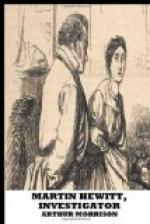Kentish stared gloomily at the tracks and said nothing.
“However,” Hewitt resumed, “I think I’ll take a little walk now and think over it. You go into the house and show yourself at the bar. If anybody wants to know how Crockett is, he’s pretty well, thank you. By the by, can I get to the Cop—this place of Taylor’s—by this back lane?”
“Yes, down to the end leading to the Catton road, turn to the left and then first on the right. Any one’ll show you the Cop,” and Kentish shut the door behind the detective, who straightway walked—toward the Old Kilns.
In little more than an hour he was back. It was now becoming dusk, and the landlord looked out papers from a box near the side window of his snuggery, for the sake of the extra light. “I’ve got these papers together for you,” he said, as Hewitt entered. “Any news?”
“Nothing very great. Here’s a bit of handwriting I want you to recognize, if you can. Get a light.”
Kentish lit a lamp, and Hewitt laid upon the table half a dozen small pieces of torn paper, evidently fragments of a letter which had been torn up, here reproduced in fac-simile:
[Illustration: six scraps of paper: mmy, throw them ou, right away, left hi, hate his, lane wr]
The landlord turned the scraps over, regarding them dubiously. “These aren’t much to recognize, anyhow. I don’t know the writing. Where did you find ’em?”
“They were lying in the lane at the back, a little way down. Plainly they are pieces of a note addressed to some one called Sammy or something very like it. See the first piece, with its ‘mmy’? That is clearly from the beginning of the note, because there is no line between it and the smooth, straight edge of the paper above; also, nothing follows on the same line. Some one writes to Crockett—presuming it to be a letter addressed to him, as I do for other reasons—as Sammy. It is a pity that there is no more of the letter to be found than these pieces. I expect the person who tore it up put the rest in his pocket and dropped these by accident.”
Kentish, who had been picking up and examining each piece in turn, now dolorously broke out:
“Oh, it’s plain he’s sold us—bolted and done us; me as took him out o’ the gutter, too. Look here—’throw them over’; that’s plain enough—can’t mean anything else. Means throw me over, and my friends—me, after what I’ve done for him! Then ’right away’—go right away, I s’pose, as he has done. Then”—he was fiddling with the scraps and finally fitted two together—“why, look here, this one with ‘lane’ on it fits over the one about throwing over, and it says ‘poor f’ where its torn; that means ’poor fool,’ I s’pose—me, or ‘fathead,’ or something like that. That’s nice. Why, I’d twist his neck if I could get hold of him; and I will!”




